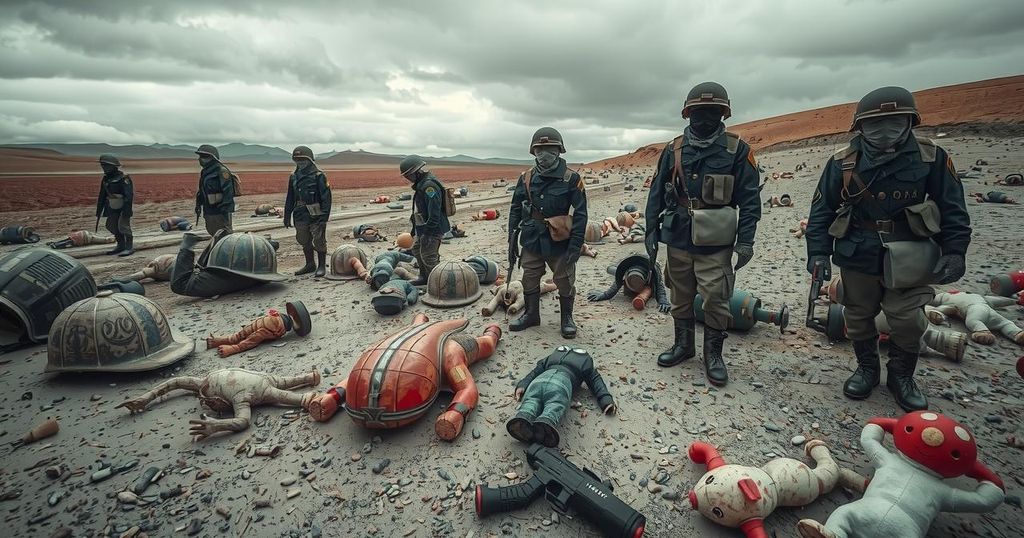The Recruitment and Use of Child Soldiers in Sudan

The conflict in Sudan has resulted in severe humanitarian crises, particularly affecting children, with over 10 million experiencing violence and many recruited as child soldiers by armed groups. Legal frameworks exist to protect children, yet violations persist amidst the ongoing violence. Genocide Watch urgently calls for international intervention to address these crises and support affected children.
The conflict in Sudan, initiated in April 2023 between the Rapid Support Forces (RSF) and the Sudanese Armed Forces (SAF), has resulted in over 60,000 fatalities and has displaced millions. More than 30 million individuals in the country are in dire need of humanitarian assistance due to this ongoing struggle for power. The situation has escalated into a severe child protection crisis, with over 10 million children having encountered brutal violence, including witnessing family killings and village massacres, and more than 200 children subjected to rape.
The current turmoil has rendered children particularly vulnerable to recruitment by armed groups. A child soldier is defined as any person under 18 who is part of an armed conflict, either directly or indirectly. Reports indicate that both RSF and SAF have engaged in the recruitment of children, with disturbing visual evidence circulated on social media. UN Special Rapporteur Siobhán Mullaly pointed out that RSF primarily targets unaccompanied children and those from impoverished backgrounds, particularly in regions around Khartoum and Darfur, with reports of over 600 RSF child soldiers becoming casualties by August 2023.
Several factors contribute to the recruitment of child soldiers in Sudan. Children often face intimidation or are compelled by extreme poverty to enlist with armed factions. In some cases, families perceive military enlistment as a form of employment, leading to parental encouragement for children to join. The RSF also incentivizes recruits through stolen food and vital aid, which has been described as forced labor and a violation of international law by UN Special Rapporteur Tomoya Obokata. Additionally, local leaders facilitate recruitment at the behest of RSF commanders, and local customs, such as the tribal faza’a tradition, further promote child engagement in combat.
The plight of child soldiers entails significant physical and psychological trauma, leading to issues such as anxiety, depression, and impulsiveness, hindering their reintegration into society. Furthermore, these children are at greater risk for criminal behavior, substance abuse, social isolation, and extreme violent acts. Various treaties exist to safeguard children during armed conflicts, particularly condemning the recruitment of minors for combat roles, which constitutes serious human rights violations.
Sudan’s international commitments include the Optional Protocol to the Convention on the Rights of the Child, which prohibits the involvement of children in armed conflict, aligning with the country’s Child Act of 2010. However, violations persist as both the Sudanese government and armed factions continue to recruit minors, contravening these legal protections.
In light of these grave circumstances, Genocide Watch has called for immediate action from the UN Security Council, advocating the establishment of a Commission of Inquiry, heightened protection for humanitarian assets, and increased efforts to liberate and support child soldiers. The UN is urged to develop programs specializing in the rehabilitation and reintegration of these children, ensuring survivor-centered support services for victims of sexual violence. Furthermore, the Security Council is requested to authorize enhanced international military presence to safeguard civilians and prevent further atrocities in Sudan.
The recruitment and use of child soldiers in Sudan represents a grave humanitarian crisis exacerbated by ongoing conflict. With millions affected, particularly children enduring extreme violence and trauma, proactive measures are essential. Legal frameworks and international treaties exist to protect these vulnerable populations, yet significant violations continue. Urgent action is warranted from international bodies to ensure the protection, support, and reintegration of child soldiers, alongside addressing the underlying causes of their recruitment.
Original Source: www.genocidewatch.com








